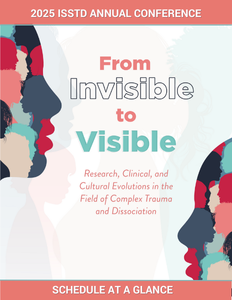Back
Symposium
Bringing Neurobiological Insights on Trauma and Dissociation into Therapeutic Practice
Embodied Cognition Alterations After Trauma: The Impact of Moral Injury on Bodily Self-consciousness in PTSD and Dissociation
Thursday, March 13, 2025
8:30 AM – 5:00 PM US Eastern Time
Location: Avenue 34: The Loft

Sherain Harricharan, PhD (she/her/hers)
Clinical Psychology Graduate Student
McMaster University
Hamilton, Ontario, Canada
Abstract
Moral injury (MI) refers to the psychological distress endured when an individual’s moral compass is violated following an act of perceived transgression on part of themselves or others. MI can be a cascading effect in the aftermath of trauma that permeates among survivors, where they can often be consumed with deep feelings of shame and guilt. This has direct impact on neural networks of social cognition, where intense feelings of shame can elicit traumatized individuals to disengage from the world and experience psychological escape through dissociation. A key neural correlate that overlaps with both social cognition and dissociative symptomatology is the temporoparietal junction (TPJ), which is important for both self-other distinction and theory-of-mind processes. To study this, we investigated the bilateral TPJ using a generalized psychophysiological interaction fMRI analysis that examined their functional connectivity patterns during a script-driven memory retrieval paradigm of morally injurious events among individuals with PTSD (n=65) and healthy controls (n=25) that involved exposure to direct versus averted eye contact. During direct eye contact while recalling a morally injurious traumatic memory, PTSD participants showed increased right TPJ connectivity with the right occipital lobe versus healthy controls. Moreover, regression analysis with dissociation measures revealed a negative correlation between the right TPJ and the left dorsolateral prefrontal cortex. Taken together, the threat of direct eye contact after recalling a morally injurious memory may decrease connectivity in prefrontal brain regions involved in abstract reasoning as a traumatized individual struggles to evaluate their own sense of self in relation to others. Implications for future psychotherapeutic interventions aimed targeting social engagement for individuals with PTSD are discussed.
Moral injury (MI) refers to the psychological distress endured when an individual’s moral compass is violated following an act of perceived transgression on part of themselves or others. MI can be a cascading effect in the aftermath of trauma that permeates among survivors, where they can often be consumed with deep feelings of shame and guilt. This has direct impact on neural networks of social cognition, where intense feelings of shame can elicit traumatized individuals to disengage from the world and experience psychological escape through dissociation. A key neural correlate that overlaps with both social cognition and dissociative symptomatology is the temporoparietal junction (TPJ), which is important for both self-other distinction and theory-of-mind processes. To study this, we investigated the bilateral TPJ using a generalized psychophysiological interaction fMRI analysis that examined their functional connectivity patterns during a script-driven memory retrieval paradigm of morally injurious events among individuals with PTSD (n=65) and healthy controls (n=25) that involved exposure to direct versus averted eye contact. During direct eye contact while recalling a morally injurious traumatic memory, PTSD participants showed increased right TPJ connectivity with the right occipital lobe versus healthy controls. Moreover, regression analysis with dissociation measures revealed a negative correlation between the right TPJ and the left dorsolateral prefrontal cortex. Taken together, the threat of direct eye contact after recalling a morally injurious memory may decrease connectivity in prefrontal brain regions involved in abstract reasoning as a traumatized individual struggles to evaluate their own sense of self in relation to others. Implications for future psychotherapeutic interventions aimed targeting social engagement for individuals with PTSD are discussed.

